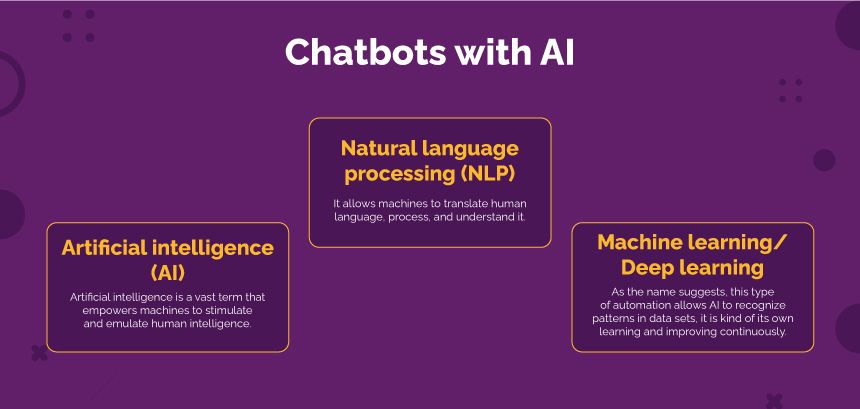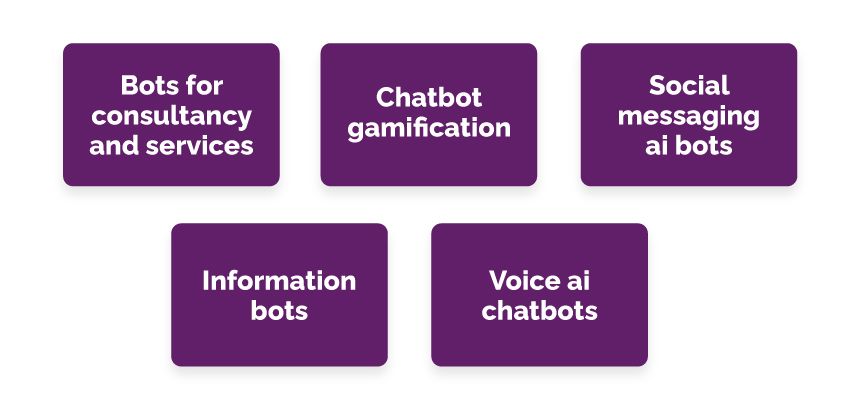In today’s digital revolutionized landscape, chatbots are considered to be a fascinating creation by mankind. Chatbots equipped with artificial intelligence have the comprehensive ability to handle more than usual i.e customer service representation. Businesses that belong to different sectors can acknowledge the fact that chatbot software can manage all incoming queries and streamline them according to priority.
AI bots are replacing and augmenting human support agents with artificial intelligence, natural language processing (NLP), and Machine learning technologies. The amalgamation of all these technologies constructed a conversational application named AI chatbots, here to aid customer service, engagement, and support.
Types of an AI chatbot
Rule-based chatbots/Click bots
Businesses that use predefined conversational paths in their dealings most frequently use ruled-based or click chatbots. A set of predetermined questions are inserted into the knowledge base so if users ask outside these questions, the bots are unable to answer them.
Questions should be versatile due to their limited nature, different images, gifs, audio, and videos can also assist consumers in this regard. In comparison to automated chatbots, Click bots tend to be implemented faster, and are inexpensive.
Button/Menu based bots
It is the most basic type of bot currently implemented in the market today. Commonly, this type of bot presents the questions & answers in the form of hierarchical decision trees. The design of button-based bots is like the automated phone menus that we see in our daily routine. Users will get multiple options to inquire thoroughly in order to get answers.
These chatbots are capable of answering 80% of the FAQs that make up most of the support queries.
Con: The only con of menu-based bots is they are not equipped for advance level queries as it requires more variables and a knowledge base. Users might not be able to get desired answers due to the slow response rate of it.
Chatbots with AI

Automated chatbots are equipped with artificial intelligence technology that intelligently handles conversations with customers. The main constituents of online chatbots are machine learning (ML) and natural language processing (NLP). Below are the brief definitions of these so-called terms:
AI
Artificial intelligence is a vast term that empowers machines to stimulate and emulate human intelligence. Technology has incorporated so much into our everyday lives that, for instance, Netflix uses AI to showcase movies based on your preferences, Spotify suggests songs similar to your playlist, and of course, youtube already has insights into what the next video might be according to your interest.
Natural language processing (NLP)
It allows machines to translate human language, process, and understand it. This tech provides meaning to the relevant keywords, for example, it denotes a grammatically accurate translation of a word spoken or written. A good example of NLP is spam filters, it reads email and decides whether it belongs to the inbox or spam folder.
Machine learning/Deep learning
As the name suggests, this type of automation allows AI to recognize patterns in data sets, it is kind of its own learning and improving continuously. A classic example is a Chess bot or any other bot that uses previous ML game data to make amended moves and recognize which moves are weak. In 2005, it was recorded as the last victory by a human against a chess AI bot.
Use cases for online AI chatbots

AI bots are segregated into two types, AI bots, and FAQ bots. Besides, these are purely technical views, that don’t include the versatile uses of website chatbots. Here we’re going to break down the use cases of AI chatbots according to the user-end perspective.
Bots for consultancy and services
A simple assistant can be relatively used for first-level support, for instance, to directly answer repeating questions from customers. In the case of complex level questions, the first-level support can refine the queries and find out what kind of problem needs to be solved first, so it can be directed to the right agent.
Here’s an example of the clothing/eCommerce industry:
Most industries now use WhatsApp to conduct business and carry out customer service via WhatsApp business. Due to this, the international eCommerce company has been able to reduce the average turnaround time for consumer queries by 50%, meanwhile offering fast responses.
Chatbot gamification
These kinds of chatbots are associated with games and are created to ask Q/A from users in order to collect data.
Example for gamification bots:
The formation of personalized videos for users via Q/A structure. Another good example is the process through which the employer gets to know their employee via a set of generated questions. The series of questions contains information about the company and its products.
Social messaging ai bots
Social media platforms are combining newness and innovation with the passing day. Therefore, corporations have deployed chatbots for business all across their preferred customer messaging platform. Including - Facebook, Instagram, WhatsApp, Twitter, and messenger.
The purpose is to engage customers for a more pleasant experience and an increased growth rate for the company.
Information bots
The most eminent and thriving bots are the information-providing bots, they are programmed to inform you about recent or topic-specific news based on defined parameters; Location, date, and content preference. These kinds of bots mainly work as FAQ categories giving answers by using AI and NLP.
Voice ai chatbots
To make the conversation more accessible and vernacular, corporations are now integrating voice-enabled bots to handle day-to-day queries. In the last couple of years, voice bots are on the rise, for instance, Apple’s assistant Siri, Amazon Alexa, and whatnot. It has created so much ease and convenience for customers as they only have to speak.
Key applications of AI chatbot

Above you’ve read about the types of an automated chatbots, now we’ll explain the key applications/uses of chatbots in business:
Appointment scheduling/Booking bots
Be it healthcare, airline, or hotel industries, scheduling bots are all that you need to operate. These automated bots help customers to book an appointment with the company or human agent. The highlight is the linking to google calendar, so when a consumer books a call with the respective company it automatically saves the date with a reminder.
Moreover, the HR team also uses booking bots to schedule interviews with candidates for recruitment purposes. Besides, if you’ve got a business that requires a lot of client meetings and consumer queries, this bot serves the purpose.
Some of the ai chatbots for business fall under this category:
- Bots for appointment booking
- HR bots for scheduling meetings and interviews
- Travel bots for giving flight information
- Service bots for automated services and queries
Customer support chatbots
This has to be one of the most popular forms of chatbots. Whenever we hear the word customer service representative the first word that comes to mind is an automated operation of the whole communication process. Website chatbots can perform all the tasks a customer support representative would do, and we may add, it does it very well. Most businesses add AI bots to more than one point of contact, for example, a self-service knowledge base, mobile apps, and websites.
Use cases: It provides you with 24/7 availability, easy solutions, instant replies, and quick information. Moreover, live chat not only improves customer service but also strengthens the relationship between consumer and business, and works its way to building loyal customers.
Online chatbots are equipped with gathering customer feedback and can send it to your backend team so that you can work on all the shortcomings for the future.
- Bot arrangements fall under this category:
Ecommerce/Retail bot
This type of bot handles all the retail and eCommerce business-related queries and helps sell your product directly.
Telecom bot
It provides customers the convenience of making payments, checking bills, price inquiries, subscription plans, and changing plans.
Banking bots
It is specifically designed to cater to your needs at the banking interactively. It provides all kinds of information from solving account-related queries to ongoing offers, and information about your checkbooks.
Specialized marketing and sales chatbot
Marketing and sales are the most widely established use cases of automated chatbots. The bots are well-positioned and intelligent in that they can personalize the customer experience, support a larger engagement capacity, target a wide range of customers, send relevant notifications, analyze customer feed and data, and efficiently move customers through the sales funnel lead.
AI Chatbot future prospects
Chatbots build up customer experience without replacing it, also, by looking at the current diversification of AI in businesses like banking, customer service, sales, marketing, healthcare and IT. It is highly anticipated that soon this advanced customer support system will entirely replace the call center structure. There are currently two assumptions about ai chatbot businesses:
By using predictive and sentiment analysis it will become as effective as human agents.
Without reverting to human agent intervention for complex queries, it will provide solutions to all the complicated ques.
This innovation can also affect the data collection process and offer deep analytics and customer insights to predict buyer journeys on a website.

